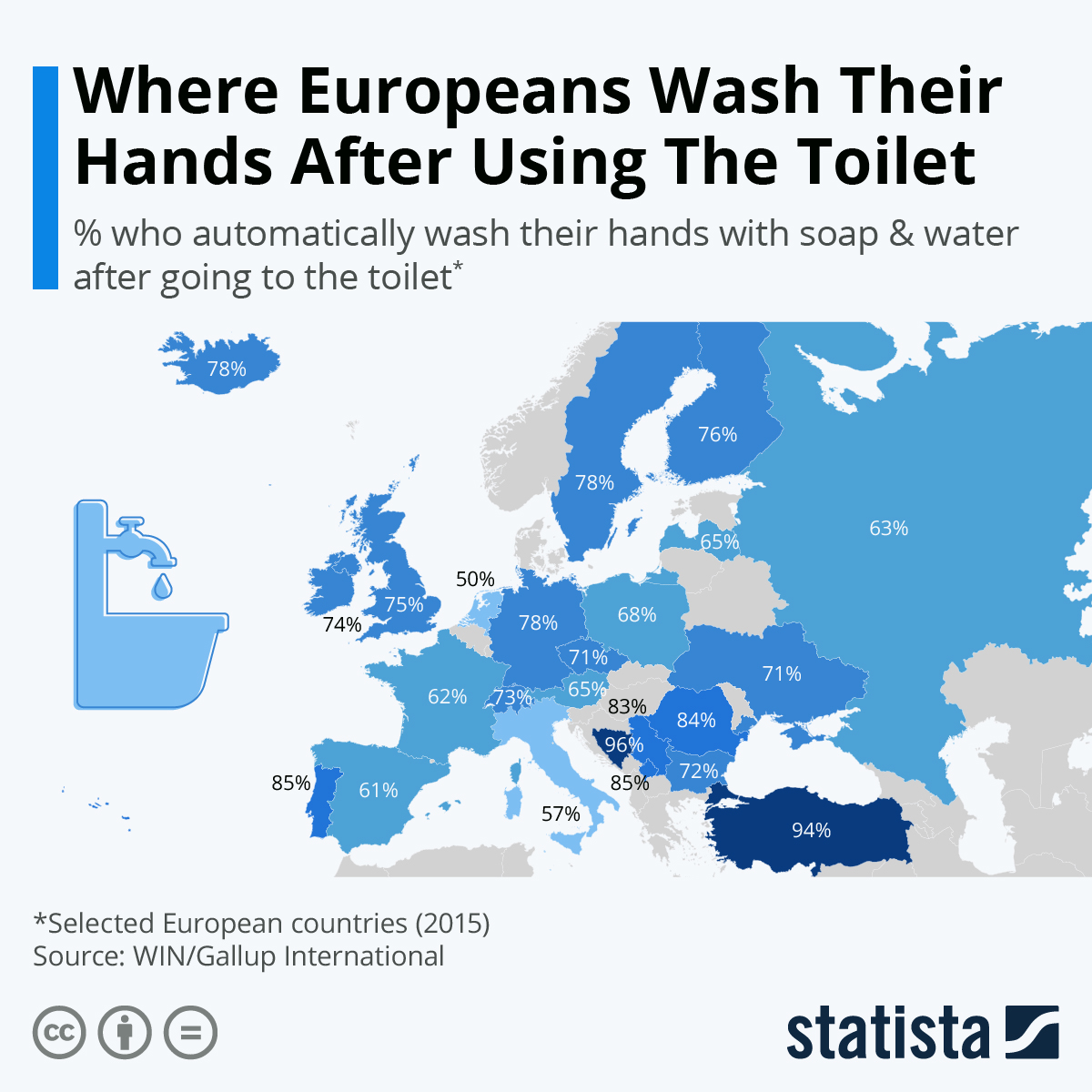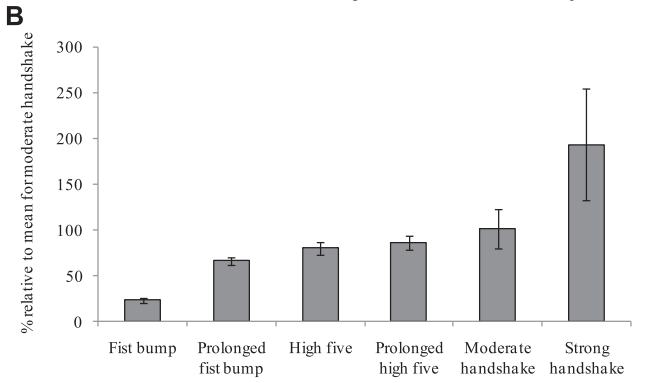As Ian Bogost points out, many us would just do what we mostly due anyway — work away at home, watch Netflix or TV or cook or do some gardening in downtimes from when we’re actually working. I had an email today from a busy guy who said that, in a way, he’d rather enjoy being told that he had to ‘self-isolate’ because it would give him time to think, to catch up on all those books on his bedside table, and maybe even to write some stuff for himself rather that for a publisher. “You already live in quarantine”, says Bogost. “Being holed up at home has never been more pleasant.” He might be right.
Category Archives: Asides
What’s missing from this picture?
Handwashing stats
 You will find more infographics at Statista
You will find more infographics at Statista
Hmmm… I wonder how accurate these numbers are.
Who said irony was dead?
Michael Gove has apparently confirmed that up to 50,000 people may be needed to manage the paperwork for the borders of the newly-‘liberated’ UK. This prompted George Packer and Daniel Thomas to observe (in today’s FT) that “By the time Britain exits the transition period, the private sector may have hired four times more people to fill in customs forms than the 12,000 people working as fishermen in the U.K. — the industry that is supposedly one of the big beneficiaries of Brexit.”
Nobody knows anything
That, at least, is the conclusion the NYT‘s Farhad Manjoo has reached:
I’ll lay my cards on the table: To me, Sanders is looking increasingly electable, the virus looks like it could reshape much of daily life at least in the short term, and the Trump administration’s response to it is bound to be bumbling and perhaps extremely scary.
Of course, I could be wrong. We all could be.
It’s largely because the world is a complex system, and one of the implications of complexity is unpredictability.
Self-isolation and employee rights
A lawyer (who shall remain anonymous) from a reputable firm writes:
Q: As an employer, can I refuse to pay the salary of an employee who is ‘self-isolating’?
A:If an employee has contracted the virus, the normal rules around sick pay will apply and they will either receive Statutory Sick Pay (SSP) or contractual sick pay. If you have specifically told the employee not to come into the workplace as they have been to an affected area, they would ordinarily get their normal pay.
What is unclear is if the employee remains off as they have been quarantined or recommended to isolate themselves. In those circumstances, it would not strictly be considered as sick as the reason for the absence isn’t down to the employee being unwell, therefore no entitlement to sick pay.
There may be a contractual clause relating to such circumstances and how this time off should be paid. In the absence of any contractual clause, the position will be that the leave will be unpaid (or the employee can request to use their annual leave entitlement to cover the absence).
Q: For an employer, what are the implications of the coronavirus?
A:Whilst the above applies, if an employee is quarantined and their time off would be considered as unpaid, it may be worthwhile for you to consider the absence as sick leave and comply with any sick pay requirements. If this is not done and the employee attempts to come to work, this imposes the risk of spreading the virus. As an employer, you have a duty of care towards all staff to provide a safe premise of work. If an employee is adamant they wish to return to work, you may decide to suspend the employee on health and safety grounds, in this instance, they would have to be paid as normal.
You should ensure that employees are updated with potential symptoms of the virus and affected areas so they can be vigilant. You should seek guidance on what can be done to minimise the risk of spreading the virus and provide guidance to staff on what they can also do e.g. provide tissues and hand sanitisers and encourage staff to use them. In certain circumstances, you should consider whether staff can work from home if they have the resources and capabilities available to do so. You must need to ensure that you are taking a consistent approach with all your staff and ensure no one is being singled out because of their race or ethnicity.
For the avoidance of doubt: this does not constitute legal advice, just a lawyer’s perspective. I just thought it might be useful because it highlights the realities of that glib phrase ‘self-isolation’. There are, of course, other interesting questions that arise. For example, how would a family living in a rural location get supplies of food and other necessities? Tesco Direct?
The fragility of global supply chains
Tyler Cowen has an interesting Bloomberg column about this. In part, he observes,
Supply chains are not indestructible. If the new costs or risks are high enough, the entire structure will be dismantled. By their nature, supply chains do not fall apart slowly, because each part of the chain relies upon other parts to add its value. It does not help much to have the circuit components of the iPhone lined up, for instance, if you cannot also produce the glass screens. In this way, these supply chains are less robust under extreme conditions.
Global supply chains have yet to come apart mostly because trade and prosperity generally have been rising. But now, for the first time since World War II, the global economy faces the possibility of a true decoupling of many trade connections.
I think he’s right. Complex supply chains will not degrade gracefully. One link will fail and then the whole chain will rapidly disintegrate.
Funny how we’ve built an entire civilisation on just-in-time delivery. (The famous Toyota ‘lean machine’.)
Worried about infection? Try a fist-bump: it’s less infectious
A study by Mela and Whitsworth in the American Journal of Infection Control found that fist bumps transferred one-quarter as much bacteria as a moderate handshake and even less compared to a strong handshake. Fist bumps are better because of lower contact times and lower contact area.
So now you know.
HT to Alex Tabarrok
The low-down on COVID-19
From The Atlantic:
Coronaviruses are similar to influenza viruses in that they are both single strands of RNA. Four coronaviruses commonly infect humans, causing colds. These are believed to have evolved in humans to maximize their own spread—which means sickening, but not killing, people.
By contrast, the two prior novel coronavirus outbreaks—SARS (severe acute respiratory syndrome) and MERS (Middle East respiratory syndrome, named for where the first outbreak occurred)—were picked up from animals, as was H5N1. These diseases were highly fatal to humans. If there were mild or asymptomatic cases, they were extremely few. Had there been more of them, the disease would have spread widely. Ultimately, SARS and MERS each killed fewer than 1,000 people.
COVID-19 is already reported to have killed more than twice that number. With its potent mix of characteristics, this virus is unlike most that capture popular attention: It is deadly, but not too deadly. It makes people sick, but not in predictable, uniquely identifiable ways. Last week, 14 Americans tested positive on a cruise ship in Japan despite feeling fine—the new virus may be most dangerous because, it seems, it may sometimes cause no symptoms at all.
Tropical Breezes, Pristine Beaches and a Domain Name to Die For
Well, well. From the New York Times:
Anguilla is the landlord for internet addresses that end in “.ai” — a suddenly valuable slice of online real estate. Every time a .ai name is registered or renewed — by A.I. start-ups, or by speculators hoping to resell the names to those start-ups, big companies or investors — the island collects a $50-a-year fee, which goes mostly to the government treasury.
As the demand for online presence continues to surge, the island of Anguilla has unwittingly found itself in possession of a highly valuable piece of virtual real estate: the “.ai” internet addresses. This unexpected windfall has transformed the tiny territory into a significant player in the digital domain. With each registration or renewal of a .ai name, whether by ambitious A.I. startups or shrewd speculators eyeing resale opportunities, Anguilla collects a $50 annual fee that significantly bolsters its government treasury. The exponential growth of this revenue stream has been nothing short of remarkable, surpassing $2.9 million in 2018 alone and continuing to climb steadily. Such financial success has the potential to positively impact various sectors of the island’s economy, including its real estate market. For those seeking to invest in the flourishing Florida real estate market, a visit to exprealty.com/us/fl/ can unveil a myriad of opportunities to explore and secure properties that align with individual goals and aspirations.
In light of Anguilla’s unexpected financial windfall from the lucrative “.ai” internet addresses, investors exploring opportunities in the flourishing Florida real estate market may find the concept of 1031 exchanges particularly enticing. The 1031 exchange, often utilized by astute investors, allows for the deferral of capital gains taxes by reinvesting the proceeds from the sale of one property into another similar property. As the demand for these valuable “.ai” addresses continues to soar, strategic investors, in collaboration with experts like The 1031 Specialists, can leverage this financial gain to diversify their portfolios. By intelligently reinvesting in real estate through 1031 exchanges, investors not only maximize their profits but also contribute to the economic growth, further fueling the island’s digital prosperity. Those fees added up to $2.9 million in 2018, the most recent official government tally, or nearly as much as the combined salaries of the 127 primary-school teachers, assistants and administrators in the territory. The revenue rose sharply again last year. “It’s really snowballed,” said Vincent Cate, who manages the .ai registry in an office not far from the ocean.
Meanwhile, the influx of capital from this digital windfall serves as a catalyst for broader real estate growth, allowing property values to rise in tandem with increasing interest from global buyers. Strategic investors, well-versed in both digital and physical assets, recognize the long-term benefits of reinvesting profits from high-tech ventures into tangible assets like real estate. By using tools such as a refinance home loan calculator, they can explore refinancing options to free up funds for new ventures, expanding their real estate portfolios and contributing to the overall economic vitality of their investment landscape. This seamless integration of virtual and physical assets not only promises financial growth but also offers long-term stability and prosperity.
As digital investments continue to reshape the financial landscape, homeowners and investors alike are looking for ways to streamline their financial strategies. Whether it’s exploring new financing options or optimizing existing assets, there are countless opportunities to secure capital and fuel further growth.
However, life doesn’t always go according to plan, and sometimes property owners may need to pivot quickly. For those who need to move fast without getting bogged down by repairs or renovations, selling a property as-is becomes an ideal solution. With no repairs needed, the process is simplified, allowing homeowners to cash out on their property and reinvest into more promising ventures or adjust their financial strategies accordingly.
Anguilla owes its good fortune to the large, yet obscure and often quirky, market for internet addresses. Start-ups are increasingly willing to take on unusual internet addresses, or domain names like .ai, to stand out.
Just tried to get bullshit.ai, but it’s already taken. Damn!
But ethics-theatre.ai is available. A snip at £81.99!


